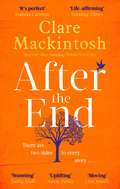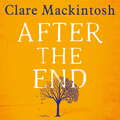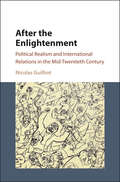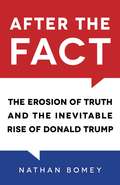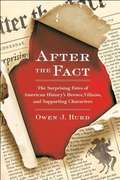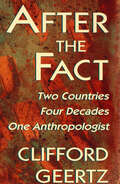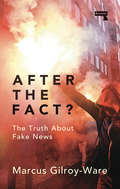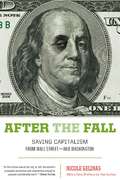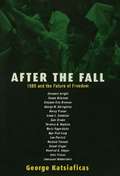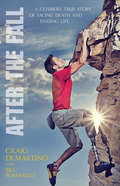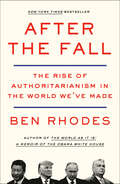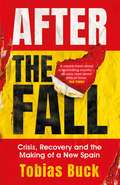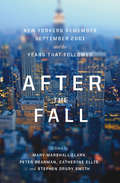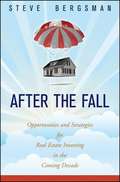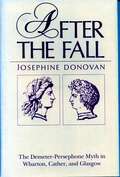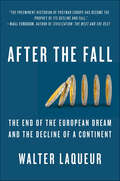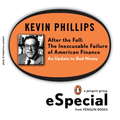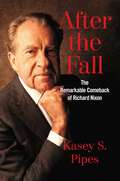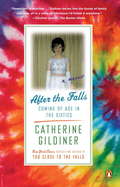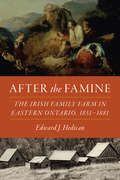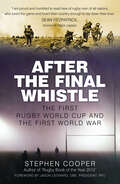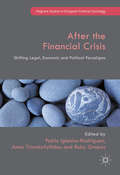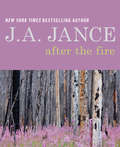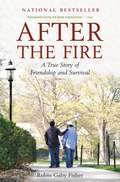- Table View
- List View
After the End: The powerful, life-affirming novel from the Sunday Times Number One bestselling author
by Clare MackintoshHave you read the book that everyone's talking about?'If I could give this book 10 stars I would' (Reader review)'This book touched my soul' (Reader review)'I could not put it down. What a story. What a storyteller' (Reader review)'This is in my top five books of all time. Absolutely incredible' (Reader review)'I have never felt so emotionally wrapped up in characters in a book' (Reader review)No. 1 bestseller Clare Mackintosh brings you the most moving book you'll read this year. After the End is powerful, uplifting and full of hope.__________________________Max and Pip are the strongest couple you know. Only now they're facing the most important decision of their lives - and they don't agree.With the consequences of an impossible choice threatening to devastate them both, nothing will ever be the same again.But anything can happen after the end . . .Clare Mackintosh returns with an unmissable thriller this summer - Hostage is out now.***********'The most moving book you'll read this year' LISA JEWELL'Life-affirming . . . richly drawn' SUNDAY TIMES 'Compelling and clever, tender and true. I can't stop thinking about it' LIANE MORIARTY'Heart-wrenching . . . an absolute must-read' MIKE GAYLE'Put this on the top of your list. You won't regret it' JANE CORRY'One of the most moving stories I have ever read. It's perfect' JOANNA CANNON
After the End: The powerful, life-affirming novel from the Sunday Times Number One bestselling author
by Clare MackintoshHave you read the book that everyone's talking about?'If I could give this book 10 stars I would' (Reader review)'This book touched my soul' (Reader review)'I could not put it down. What a story. What a storyteller' (Reader review)'This is in my top five books of all time. Absolutely incredible' (Reader review)'I have never felt so emotionally wrapped up in characters in a book' (Reader review)Powerful, uplifting and full of hope, AFTER THE END is the most moving book you'll read this year - from number one bestseller Clare Mackintosh__________________________Max and Pip are the strongest couple you know. Only now they're facing the most important decision of their lives - and they don't agree.With the consequences of an impossible choice threatening to devastate them both, nothing will ever be the same again.But anything can happen after the end . . .***********'The most moving book you'll read this year' LISA JEWELL'Life-affirming . . . richly drawn' SUNDAY TIMES 'Compelling and clever, tender and true. I can't stop thinking about it' LIANE MORIARTY'Heart-wrenching . . . an absolute must-read' MIKE GAYLE'Put this on the top of your list. You won't regret it' JANE CORRY'One of the most moving stories I have ever read. It's perfect' JOANNA CANNON
After the Enlightenment: Political Realism and International Relations in the Mid-Twentieth Century
by Nicolas GuilhotAfter the Enlightenment is the first attempt at understanding modern political realism as a historical phenomenon. Realism is not an eternal wisdom inherited from Thucydides, Machiavelli or Hobbes, but a twentieth-century phenomenon rooted in the interwar years, the collapse of the Weimar Republic, and the transfer of ideas between Continental Europe and the United States. The book provides the first intellectual history of the rise of realism in America, as it informed policy and academic circles after 1945. It breaks through the narrow confines of the discipline of international relations and resituates realism within the crisis of American liberalism. Realism provided a new framework for foreign policy thinking and transformed the nature of American democracy. This book sheds light on the emergence of 'rational choice' as a new paradigm for political decision-making and speaks to the current revival in realism in international affairs.
After the Fact: The Erosion of Truth and the Inevitable Rise of Donald Trump
by Nathan BomeyThis trenchant analysis examines the many ways our society's increasingly tenuous commitment to facts laid the groundwork for Donald Trump's rise to power.Award-winning journalist Nathan Bomey argues that Trump did not usher the post-truth era into being. He was its inevitable outcome. Bomey points to recent trends that have created the perfect seedbed for spin, distortion, deception, and bald-faced lies: shifting news habits, the rise of social media, the spread of entrenched ideologies, and the failure of schools to teach basic critical-thinking skillsThe evidence supporting the author's argument is all around us: On Facebook, we present images of our lives that ignore the truth and intentionally deceive our friends and family. We consume fake news stories online and carelessly circulate false rumors. In politics, we vote for leaders who leverage political narratives that favor ideology over science. And in our schools, we fail to teach students how to authenticate information.After the Fact explores how the convergence of technology, politics, and media has ushered in the misinformation age, sidelining the truth and threatening our core principle of community.
After the Fact: The Surprising Fates of American History's Heroes, Villains, and Supporting Characters
by Owen J. HurdThis book picks up where traditional histories leave offNa OWhere Are They Now?O meets History 101. Lingering on the scene long after the smoke has cleared and the spotlights have moved on, it uncovers the telling details of history's most compelling subplots.
After the Fact: Two Countries, Four Decades, One Anthropologist (The Jerusalem-Harvard Lectures #5)
by Clifford Geertz“An unabashedly honest ethnography . . . [from] a founder of ‘symbolic’ anthropology . . . reflections on his fieldwork over a period of . . . forty years. Brilliant.” (Kirkus Reviews) In looking back on four decades of anthropology in the field, Geertz has created a work that is a personal history as well as a retrospective reflection on developments in the human sciences amid political, social, and cultural changes in the world. An elegant summation of one of the most remarkable careers in anthropology, it is at the same time an eloquent statement of the purposes and possibilities of anthropology's interpretive powers.Through the prism of his fieldwork over forty years in two towns, Pare in Indonesia and Sefrou in Morocco, Geertz adopts various perspectives on anthropological research and analysis during the post-colonial period, the Cold War, and the emergence of the new states of Asia and Africa. Throughout, he clarifies his own position on a broad series of issues at once empirical, methodological, theoretical, and personal. The result is a truly original book, one that displays a particular way of practicing the human sciences and thus a particular—and particularly efficacious—view of what these sciences are, have been, and should become.“Geertz charts the transformation of cultural anthropology from a study of "primitive" people to a multidisciplinary investigation of a particular culture's symbolic systems, its interactions with the larger forces of history and modernization.” —Publishers Weekly“An elegant, almost meditative volume of reflections.” —The New Yorker“[An] engrossing story of a few key moments in American social science during the second half of the twentieth century as [Geetz] participated in them.” —New York Times Book Review
After the Fact?: The Truth about Fake News
by Marcus Gilroy-WareWhy do we no longer trust facts, experts and statistics? In this essential guide to the turbulent times in which we live, Marcus Gilroy-Ware investigates our era of post-truths and fake news and answers the question of where we can go from here.We are supposed to have more information at our disposal now than at any time in history. So why, in a world of rising sea levels, populist leaders, resurgent fascism and a global pandemic, do so many people believe bizarre and untrue things about the world we live in? In After the Fact?, Marcus Gilroy-Ware shows us what really created the conditions for mis- and disinformation, from fake news and conspiracy theories, to bullshit journalism and the resurgence of the far-right, and why liberal newspaper columnists and centrist politicians are unable to turn back this tide. Spanning politics, culture, psychology, journalism, and much more, After the Fact? is a timely wake-up call for those who believe we can simply go "back to normal", and instead argues that, if we are to put an end to "fake news" we must deal with the broader social crises that are responsible for it.
After the Fall
by Nicole GelinasRobust financial markets support capitalism, they don't imperil it. But in 2008, Washington policymakers were compelled to replace private risk-takers in the financial system with government capital so that money and credit flows wouldn't stop, precipitating a depression.Washington's actions weren't the start of government distortions in the financial industry, Nicole Gelinas writes, but the natural result of 25 years' worth of such distortions.In the early eighties, modern finance began to escape reasonable regulations, including the most important regulation of all, that of the marketplace. The government gradually adopted a "too big to fail" policy for the largest or most complex financial companies, saving lenders to failing firms from losses. As a result, these companies became impervious to the vital market discipline that the threat of loss provides.Adding to the problem, Wall Street created financial instruments that escaped other reasonable limits, including gentle constraints on speculative borrowing and requirements for the disclosure of important facts.The financial industry eventually posed an untenable risk to the economy -- a risk that culminated in the trillions of dollars' worth of government bailouts and guarantees that Washington scrambled starting in late 2008.Even as banks and markets seem to heal, lenders to financial companies continue to understand that the government would protect them in the future if necessary. This implicit guarantee harms economic growth, because it forces good companies to compete against bad.History and recent events make clear what Washington must do.First, policymakers must reintroduce market discipline to the financial world. They can do so by re-creating a credible, consistent way in which big financial companies can fail, with lenders taking their warranted losses. Second, policymakers can reapply prudent financial regulations so that markets, and the economy, can better withstand inevitable excesses of optimism and pessimism. Sensible regulations have worked well in the past and can work well again.As Gelinas explains in this richly detailed book, adequate regulation of financial firms and markets is a prerequisite for free-market capitalism -- not a barrier to it.
After the Fall: 1989 and the Future of Freedom (New Political Science Reader Ser.)
by George KatsiaficasDid the U.S. really "win" the Cold War? Is the fall of Communism only a temporary setback for Marxism, or has the freemarket prevailed, once and for all? In this work, the last ten years are examined by the most important Marxist scholars and journalists.
After the Fall: A Climber's True Story of Facing Death and Finding Life
by Craig Demartino Bill RomanelliCraig DeMartino never thought this would happen to him. He was 100 feet up a cliff in Rocky Mountain National Park when--with one step--his 13 years of rock climbing experience and 15 pounds of gear plummeted with him to the ground. Expert climbers say that if you fall 10 feet you have a 10% chance of dying, a 20% chance at 20 feet, 30% at 30, and so on. Craig fell 100 feet. By basic calculation, Craig should not be alive today. But he is. In the months that followed, the pain, the subsequent partial leg amputation, the media attention, and the knowledge that his body was broken challenged Craig on a daily basis. Scarier still was the realization that his faith was broken too. Slowly, as his physical body recovered, Craig's emotional and spiritual body strengthened as well. In prayer, Craig learned to take God out of a box and allow His plan and promise to be revealed. Looking back, the doctors and nurses played a big role in Craig's recovery, but it was a series of miracles that saved his life.For anyone who has been knocked down or run over by life, After the Fall not only offers an engaging read but also provides a clear message of hope: sometimes the greatest gift we can receive isn't just healing, but the power to endure.
After the Fall: Being American in the World We've Made
by Ben RhodesWhy is democracy so threatened in America and around the world? And what can we do about it? A former White House aide and close confidant to President Barack Obama—and the New York Times bestselling author of The World as It Is—travels the globe in a deeply personal, beautifully observed quest for answers. <P><P>In 2017, as Ben Rhodes was helping Barack Obama begin his next chapter, the legacy they had worked to build for eight years was being taken apart. To understand what was happening in America, Rhodes decided to look outward. Over the next three years, he traveled to dozens of countries, meeting with politicians, activists, and dissidents confronting the same nationalism and authoritarianism that was tearing America apart. Along the way, a Russian opposition leader he spoke with was poisoned, the Hong Kong protesters he came to know saw their movement snuffed out, and America itself reached the precipice of losing democracy before giving itself a second chance. <P><P>Part memoir and part reportage, After the Fall is a hugely ambitious and essential work of discovery. In his travels, Rhodes comes to realize how much America’s fingerprints are on a world we helped to shape, through our post–Cold War embrace of unbridled capitalism and our post-9/11 nationalism and militarism; our mania for technology and social media; and the racism that fueled the backlash to America’s first Black president. At the same time, Rhodes learns from the stories of a diverse set of characters—from Barack Obama himself to Cuban rebels to a rising generation of international leaders—that looking squarely at where America has gone wrong makes clear how essential it is to fight for what America is supposed to be, for our own country and the entire world. <P><P><b>A New York Times Bestseller</b>
After the Fall: Crisis, Recovery and the Making of a New Spain
by Tobias BuckTobias Buck arrived in Madrid in December 2012, in time to celebrate the bleakest Christmas the city had seen in a generation. Capital and country were reeling from a series of economic shocks that had brought Spain to the brink of ruin. The housing boom had dramatically turned to bust, a large chunk of the nation's banking system was in state hands, businesses were closing across the country, debt was spiralling out of control and unemployment levels had reached a record high.AFTER THE FALL presents a rich and vivid portrait of contemporary Spain at a critical moment in the country's history. The book tells the story of Spain's long boom and sudden bust, the brutal economic crisis that followed, and the political and social aftershocks that reverberate to this day. It explores the origins of the separatist movement in Catalonia, and its bitter clash with the Spanish government that culminated in a failed secession referendum and a divisive declaration of independence. It looks at the legacy of the Civil War and Franco dictatorship, and the continuing struggle over historical memory in Spain today. Based on five years of reporting and hundreds of interviews, AFTER THE FALL takes the reader from the offices of power in Madrid and Barcelona to the villages of the Basque country, still haunted by the memory of political violence, and to the towns of Andalusia, where an entire generation has seen its economic hopes shattered. It describes how the country has been changed by the experience of migration, and why - after decades at the margins - the far-right eventually made a return to Spanish politics. For all the problems and challenges facing Spain today, we see that amid the ruins of the crisis, the search for a new Spanish model is already underway.
After the Fall: Crisis, Recovery and the Making of a New Spain
by Tobias BuckTobias Buck arrived in Madrid in December 2012, in time to celebrate the bleakest Christmas the city had seen in a generation. Capital and country were reeling from a series of economic shocks that had brought Spain to the brink of ruin. The housing boom had dramatically turned to bust, a large chunk of the nation's banking system was in state hands, businesses were closing across the country, debt was spiralling out of control and unemployment levels had reached a record high.AFTER THE FALL presents a rich and vivid portrait of contemporary Spain at a critical moment in the country's history. The book tells the story of Spain's long boom and sudden bust, the brutal economic crisis that followed, and the political and social aftershocks that reverberate to this day. It explores the origins of the separatist movement in Catalonia, and its bitter clash with the Spanish government that culminated in a failed secession referendum and a divisive declaration of independence. It looks at the legacy of the Civil War and Franco dictatorship, and the continuing struggle over historical memory in Spain today. Based on five years of reporting and hundreds of interviews, AFTER THE FALL takes the reader from the offices of power in Madrid and Barcelona to the villages of the Basque country, still haunted by the memory of political violence, and to the towns of Andalusia, where an entire generation has seen its economic hopes shattered. It describes how the country has been changed by the experience of migration, and why - after decades at the margins - the far-right eventually made a return to Spanish politics. For all the problems and challenges facing Spain today, we see that amid the ruins of the crisis, the search for a new Spanish model is already underway.
After the Fall: New Yorkers Remember September 2001 and the Years That Followed
by Mary Clark, Peter Bearman, Catherine Ellis, Stephen SmithNew Yorkers remember 9/11 in this landmark volume of oral history commemorating the tenth anniversary of the attacks—A &“staggering book of living memory&” (Booklist, starred review). Within days of September 11, 2001, Columbia&’s Oral History Research Office deployed interviewers across the city to collect the accounts and observations of hundreds of people from a diverse mix of New York neighborhoods and backgrounds. With follow-up interviews spanning years, the project produced a deep and revealing look at how the attacks changed individual lives and communities in New York City. After the Fall presents a selection of these fascinating testimonies, with heartbreaking and enlightening stories from a broad range of New Yorkers. The interviews include first-responders, taxi drivers, school teachers, artists, religious leaders, immigrants, and others who were interviewed numerous times since the 2001 attacks. The result is a remarkable time-lapse account of the city as it changed in the wake of 9/11, one that will resonate powerfully with New Yorkers and millions of others who continue to feel the impact of the most damaging foreign attack to ever occur inside the United States.
After the Fall: Opportunities and Strategies for Real Estate Investing in the Coming Decade
by Steve BergsmanPraise for After The Fall"Steve Bergsman provides his readers with one of the most comprehensive, yet concise overviews of real estate and all its property types."--Christopher Macke, Vice President, GE Real Estate"This is an extraordinary work of detailed research and compelling writing. I've never seen the subject presented in such a cogent and skillful manner."--Phil Hall, editor, Secondary Marketing Executive"The way out of the financial crash of 2007/2008 will come through skilled operations, astute investing, and the ability of real estate practitioners to give up their mental memory of the future! The heated success of ten-year, unprecedented growth in the real estate industry has somehow atrophied the industry's application of knowledge. What we need is a fresh look at opportunities and strategies for real estate investing. We are lucky that Bergsman's book has fit the bill--just in time."--Jack M. Cohen, CEO, Cohen Financial"Insightful and informative; connects all the dots, providing the basis and foundation for making strategic decisions about real estate."--Stephen Blank, Senior Fellow, Finance, The Urban Land Institute
After the Fall: The Demeter-Persephone Myth in Wharton, Cather, and Glasgow (G - Reference, Information and Interdisciplinary Subjects)
by Josephine DonovanA continuation of Josephine Donovan's exploration of American women's literary traditions, begun with New England Local Color Literature: A Women's Tradition, which treats the nineteenth-century realists, this work analyzes the writing of major women writers of the early twentieth century—Edith Wharton, Willa Cather, and Ellen Glasgow.The author sees the Demeter-Persephone myth as central to these writers' thematics, but interprets the myth in terms of the historical transitions taking place in turn-of-the-century America. Donovan focuses on the changing relationship between mothers and daughters—in particular upon the "new women's" rebellion against the traditional women's culture of their nineteenth-century mothers (both literary and literal). An introductory chapter traces the male-supremacist ideologies that formed the intellectual climate in which these women wrote.Reorienting Wharton, Cather, and Glasgow within women's literary traditions produces major reinterpretations of their works, including such masterpieces as Ethan Frome, Summer, My Antonia, Barren Ground, and others.
After the Fall: The End of the European Dream and the Decline of a Continent
by Walter LaqueurA master historian takes us deep into the heart of Europe's current political and financial crisisWalter Laqueur was one of the few experts who predicted Europe's current financial and political crisis when he wrote The Last Days of Europe six years ago. Now this master historian takes readers inside the European crisis that he foresaw. Ravaged by the world economic meltdown, increasingly dependent on imported oil and gas, and lacking a common foreign policy, Europe is in dire straits. With the authority that comes from thirty years of experience as an expert on political affairs, the author predicts the future prospects of this troubled continent. Europe is the United States' closest ally, and its prosperity is vital to American's success and security. This is a must-read for anyone invested in our country's future.
After the Fall: The Inexcusable Failure of American Finance
by Kevin PhillipsA fascinating up-to-date look at the roots of our financial crisis from the New York Times bestselling author Kevin Phillips Kevin Phillips’s Bad Money revealed the roots of the financial malignance that led to 2008’s devastating market meltdown, explaining how the financial sector hijacked the American economy and put our very global future at risk. In this substantial and thought-provoking update, he refocuses his arguments through the lens of the real losses and reverses that have befallen us since the book’s publication. Drawing on the latest developments on Wall Street and the response from the Obama White House, After the Fall provides a sobering yet illuminating postmortem of how we got ourselves into this crisis, and what we must do going forward if we hope to emerge from it.
After the Fall: The Remarkable Comeback of Richard Nixon
by Kasey S. PipesA Main Selection of the History Book Club! The Astonishing Comeback of Richard Nixon On August 9, 1974, Richard Nixon became the first and only U.S. president to resign from office—to avoid almost certain impeachment. Utterly disgraced, he was forced to flee the White House with a small cadre of advisors and family. Richard Nixon was a completely defeated man. Yet only a decade later, Nixon was a trusted advisor to presidents, dispensing wisdom on campaign strategy and foreign policy, shaping the course of U.S.-Soviet summit meetings, and representing the U.S. at state funerals—the very model of an elder statesman. How did he do it? Nixon leveraged his still sharp mind, his peerless political instincts, his deep connections with foreign leaders—but, above all, his stubborn refusal to accept defeat—to achieve a political restoration as astonishing as the fall that preceded it. Kasey S. Pipes, advisor to President George W. Bush, tells the fascinating story of Nixon’s comeback. Using unprecedented access to the private post-presidential documents at the Nixon Library, Pipes reveals inside information that has never been reported about Nixon’s successful campaign to repair his reputation and resuscitate his career, including: The true story behind the supposed medical “hoax” to get Nixon out of testifying at the Watergate trials of his aides in Washington The strategy behind Nixon’s apparently accidental on-air “confession” of the Watergate coverup to interviewer David Frost How Nixon’s advice on the Strategic Defense Initiative (SDI) shaped Ronald Reagan’s negotiations with Gorbachev—and changed history How Nixon traveled to China after Tiananmen Square to help preserve the U.S.-Chinese relations that he had opened up years earlier The Saturday morning presidential radio address: a Nixon idea Nixon’s surprising friendship with Bill Clinton After the Fall is the gripping and never-before-told story of one of the most remarkable reversals of fortune in American political history.
After the Falls
by Catherine GildinerA hilarious and moving follow-up to The New York Times bestselling Too Close to the Falls. Catherine Gildiner shares the next chapter in a story that has already captivated many readers. It's 1960, and twelve-year-old Cathy McClure has just been thrown out of Catholic school for filling the holy water font with vodka. Hoping to give her a fresh start, Cathy's parents leave behind small-town Niagara Falls for suburban Buffalo. There, as the quaint world of 1950s America recedes into history, Cathy dives headfirst into the tumultuous new decade. But when tragedy strikes at home, Cathy-vandal, HoJo hostess, and civil rights demonstrator-must take on her most challenging role yet. .
After the Famine: The Irish Family Farm in Eastern Ontario, 1851–1881
by Edward J. HedicanThe Irish Famine saw hapless Irish citizens starve to death and die of disease, while the population of a neighbouring country, England, lived in relative bounty and apparent disinterest. After the Famine investigates the subsequent emigration of many surviving Irish to Eastern Ontario and tells the story of how, despite hardships, the Irish in Canada managed to survive and prosper after fleeing tragedy. The author explains how the Irish adapted to their new land, and how we might account for their triumph as farmers under somewhat less than favourable environmental conditions. Examining their successful farming life in rural Ontario through their agricultural performance, changing family structures, and farming adaptations, this book is a must-read for anyone interested in the fate of the Irish after their greatest calamity.
After the Final Whistle: The First Rugby World Cup and the First World War
by Jason Leonard Stephen CooperAs Britain’s Empire went to war in August 1914, rugby players were the first to volunteer. They led from the front and paid a disproportionate price. In 1919, a grateful Mother Country hosted a rugby tournament: sevens teams at eight venues, playing 17 matches to declare a first ‘world champion’. There had never been an international team tournament like it. For the first time teams from Australia, Canada, New Zealand, South Africa, Britain and France were assembled in one place. Rugby held the first ever ‘World Cup’. It was a moment of triumph, a celebration of military victory, of Commonwealth and Allied unity, and of rugby values, moral and physical. In 2019 the modern Rugby World Cup moves to Japan in the Centenary of the King’s Cup. With a foreword by Jason Leonard, this is the story of rugby’s journey through the First World War to its first World Cup, and how those values endure today. 'After The Final Whistle' was shortlisted for the 2016 Cross Sports Book of the Year award.
After the Financial Crisis: Shifting Legal, Economic and Political Paradigms (Palgrave Studies in European Political Sociology)
by Pablo Iglesias-Rodríguez Anna Triandafyllidou Ruby GropasThis international collection studies how the financial crisis of 2007 and the ensuing economicand political crises in Europe and North America have triggered a process ofchange in the field of economics, law andpolitics. Contributors to this book argue that both elites and citizens havehad to rethink the nature of the market, the role of the state as a marketregulator and as a provider of welfare, the role of political parties inrepresenting society's main political and social cleavages, the role of civilsociety in voicing the concerns of citizens, and the role of the citizen as theultimate source of power in a democracy but also as a fundamentally powerlesssubject in a global economy. The book studies the actors, the areas and the processesthat have carried forward the change and proposes the notion of 'incompleteparadigm shift' to analyse this change. Its authors explore the multipledimensions of paradigm shifts and their differentiated evolution, arguing thattoday we witness an incomplete paradigm shift of financial regulations,economic models and welfare systems, but a stillbirth of a new political andeconomic paradigm.
After the Fire
by J. A. JanceNew York Times bestselling author J. A. Jance's heartrending collection of poetry and essays recounts a dark chapter of her own life, her first marriage to an alcoholic--a powerful look at the emotional cost of addiction and an inspiring story of courage and triumph in the wake of crushing defeatBefore she found fame as a bestselling mystery author, Judith Jance wrestled with the anguish of being married to an alcoholic. For years she channeled her pain into words, composing the poems in this moving volume, first published in 1984, a year before her debut novel. In searing and direct language, After the Fire chronicles the collapse of Jance's first marriage under the weight of her husband's addiction--and her own unwitting denial and codependence while she struggled to find herself. "I will not be the price of your redemption," she wrote then. "I will not pay my life to ransom yours. "An intimate, deeply personal look into a wrenching time in Jance's life, After the Fire is a portrait of addiction and its insidious effects on lives and love. It illuminates universal truths about unbearable loss and finding the courage to carry on, and offers inspiration and profound insight into the heart and work of a beloved bestselling author.
After the Fire: A True Story of Friendship and Survival
by Robin Gaby FisherEvery so often, a book comes along that makes us cry and makes us strong, that makes us want to hug our children and call our old friends. This is one of those rare books. On January 19, 2000, a fire raged through Seton Hall University's freshman dormitory, killing three students and injuring 58 others. Among the victims were Shawn Simons and Alvaro Llanos, roommates from poor neighborhoods who made their families proud by getting into college. They managed to escape, but both were burned terribly. AFTER THE FIRE is the story of these young men and their courageous fight to recover from the worst damage the burn unit at Saint Barnabas hospital had ever seen. It is the story of the extraordinary doctors and nurses who work with the burned. It is the story of mothers and fathers, of faith and family and the invisible ties that bind us to each other. It is the story of the search for the arsonists--and the elaborate cover-up that nearly obscured the truth. And it is the story of the women who came to love these men, who knew that real beauty is a thing not seen in mirrors.
